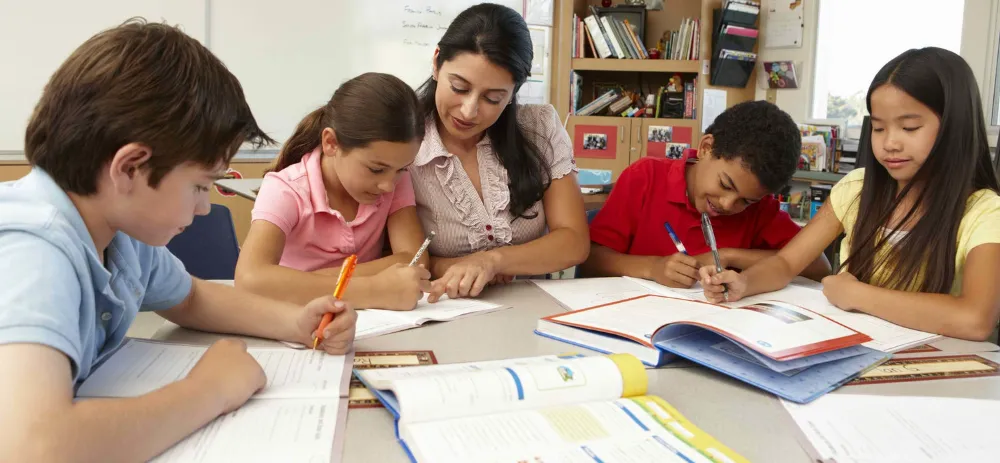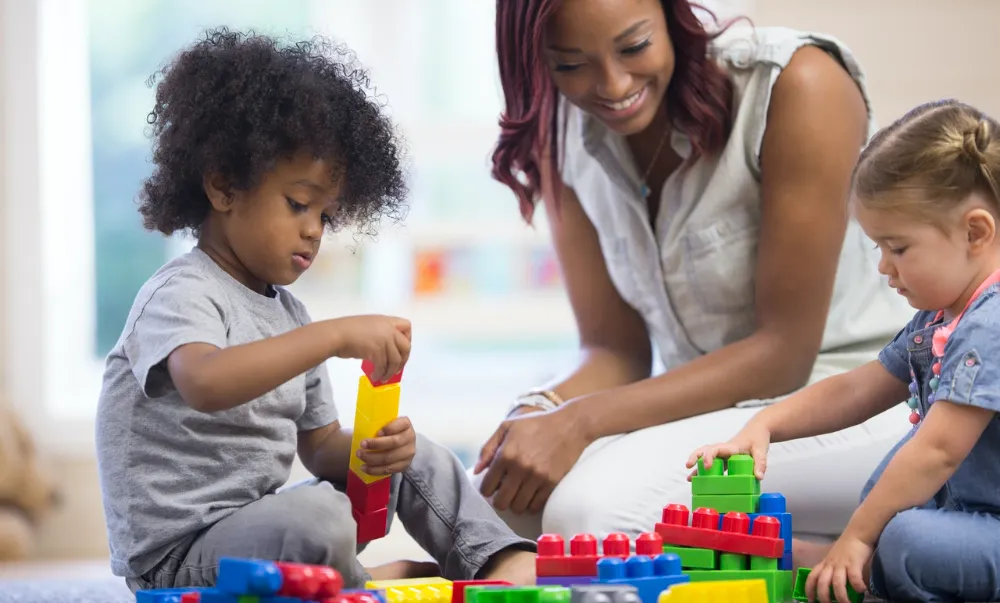Kindergarten Teaching Methods

Source: gettingsmart
Kindergarten Teaching Methods
Play in early years can promote brain development in many ways, as the child gets a clearer understanding of their immediate surroundings and sets the quintessential groundwork for later brain growth. Play is an important vehicle for the overall development of children
Kindergarten is where a kid takes their first steps into the fascinating world of learning, where they can explore, make friends, and grow. For young learners, kindergarten is their first stop, thus it’s important to make sure the appropriate teaching strategies are used. Kindergarten teaching focuses on play and forms the very basis of Kindergarten Teaching methods for young preschoolers.
Let’s explore the wonderful world of kindergarten teaching methods that arouse curiosity, foster creativity, and pave the way for a love of learning that lasts a lifetime.
The magical journey of learning begins in kindergarten, where young minds embark on a voyage of discovery. At Vidhyanidhi Education Society (VES), our Pre Primary Teachers’ Training Course includes a variety of innovative kindergarten teaching methods, helping aspiring educators unlock their students’ potential.
In this blog, we will explore the effective and engaging teaching methods that form the core of our program, ensuring the next generation of educators is well-equipped to nurture and inspire their students.
Table of Content
- Power of Play-Based Learning
- Multi-Sensory Learning
- Theme-Based Learning
- Nurturing Social and Emotional Growth
- Fostering Independence and Confidence
- Individualized Learning
- Encouraging Creativity and Imagination
- Integrating Technology Responsibly
- Collaborative Learning
- Developing a Growth Mindset
- Nature-Based Learning
- Building a Strong Home-School Connection
- Why Choose VES for Your Preschool Teachers’ Training Course?
Some of the most relevant Kindergarten Teaching Methods are as follows :

Source: scholastic
Power of Play-Based Learning
Children tend to develop some of the most important basic skills while playing. Play-based learning is the most powerful mode of teaching foundational literacy and numeracy skills. Play is spontaneous and voluntary which enables them to grasp crucial skills during their early years.
For children, play is more than just fun and games; it’s their primary method of exploring the world around them. Play-based learning forms the cornerstone of kindergarten teaching methods. From imaginative storytelling and dramatic play to solving puzzles and engaging in outdoor games, children are encouraged to experiment and learn through hands-on activities.
The power of play-based learning is vast and this approach fosters creativity, problem-solving skills, and critical thinking. Children are given autonomy to choose activities and materials based on their interests.
It enhances their imagination, increases their sense of self and self-esteem as well as their sense of the world around them, and also relieves them from boredom. Toys and games in this regard act as a medium and provide ample opportunities to play and grow.
Multi-Sensory Learning: Engaging All Senses
Children absorb information in various ways, and a multi-sensory approach to teaching caters to all learning styles. Kindergarten classrooms come alive with visual, auditory, and tactile stimuli that help children grasp concepts more holistically.
Multi-Sensory Learning engaging all senses ensures that every child’s learning pattern is adhered to. For instance, children might work on a creative art project, hear a tale, and see real caterpillars while studying the butterfly’s life cycle. This immersive approach increases students’ comprehension of their surroundings while also keeping their attention.

Source: images.squarespace
Theme-Based Learning: Connecting the Dots
In a world brimming with information, the ability to connect the dots between seemingly disparate subjects is invaluable. Kindergarten teaching methods often incorporate theme-based learning connecting the dots where a central theme ties various subjects together.
For instance, a theme on ‘The Ocean’ might encompass lessons on marine life, water conservation, and famous explorers, allowing children to see the bigger picture and grasp the interconnected nature of knowledge.
Nurturing Social and Emotional Growth
The journey of learning extends beyond academics. Kindergarten classrooms serve as a melting pot of diverse personalities, backgrounds, and cultures, making it the perfect setting for nurturing social and emotional growth.
Teachers emphasize empathy, kindness, and cooperation, guiding children to navigate interpersonal relationships and develop emotional intelligence. These vital life skills will serve them well as they continue their educational journey.

Source: mintbook
Fostering Independence and Confidence
A vital aspect of kindergarten teaching methods is fostering independence and self-confidence in children.
Teachers inspire children to take control of their learning by offering a loving environment and plenty of opportunities for exploration fostering independence and confidence in them.
They learn how to research issues, look for solutions, and keep going in the face of difficulties. Their enthusiasm for studying is stoked by this sense of independence and assurance, which also positions children for future academic success.
Individualized Learning
Kindergarten teaching methods recognize and celebrate the uniqueness of each child and therefore individualized learning forms the basis of teaching.
Teachers accommodate the talents, interests, and learning preferences of each student by offering individualized education. This Individualised learning strategy makes sure that kids get the help they require to succeed academically and have a solid feeling of their own value.
Call or Whatsapp at +919869546913 / +9198698 66277 for more details.
For Downloading the brochure click here

Source: production-tcf
Encouraging Creativity and Imagination
The sky is the limit in kindergarten when it comes to imagination and creativity. Encouraging creativity and imagination can guarantee profound learning outcomes as children grasp concepts best when taught to them in a creative manner.
Teachers provide students plenty of chances to express themselves through drama, dance, music, and visual arts. These artistic mediums encourage self-expression, emotional control, and cognitive growth while also making learning fun.
Integrating Technology Responsibly
The use of technology in kindergarten teaching methods has opened up new avenues for learning and engagement. Integrating technology responsibly is a scrupulous duty of a teacher where there is a precise balance between technology and manual methods.
Teachers use digital tools and resources responsibly, integrating them into lessons to enhance learning experiences. Interactive games, educational apps, and online platforms can complement traditional teaching methods, offering children diverse ways to explore and learn.

Source: babysparks
Collaborative Learning
Collaborative learning plays a significant role in kindergarten teaching methods. Children gain an understanding of the value of cooperation, compromise, and teamwork through participating in group activities.
In addition to fostering stronger social ties, collaborative learning teaches kids the value of different viewpoints and group problem-solving.
Developing a Growth Mindset
Children should be taught a growth mentality in kindergarten. Teachers exhort their charges to see difficulties not as impediments but as chances for personal development.
Youngsters’ resilience and love of learning are fostered by educators by applauding effort and perseverance. Developing a growth mindset and developing these traits will serve youngsters well in their future endeavors.
Nature-Based Learning
Nature-based learning is frequently incorporated into kindergarten teaching strategies, allowing kids to interact with the outdoors. Children establish a bond with nature and obtain a deeper awareness of their surroundings via outdoor play and exploration.
Learning in the natural world encourages wonder and curiosity as well as physical activity and overall health.

Source: oneeducation
Building a Strong Home-School Connection
Teachers in kindergarten understand the value of integrating parents and other adults in the learning process. Teachers can guarantee that kids get constant assistance both at home and in the classroom by keeping lines of communication open and developing a strong home-school connection. The success of a child’s education and general well-being are greatly influenced by this cooperation between the family and the school.
By building a strong home-school connection Teachers aim to attain optimal outcomes in the domains of physical and motor development, cognitive development, socio-emotional-ethical development, cultural/ artistic development, and the development of communication and early language, literacy, and numeracy through flexible, multi-faceted, multi-level, play-based, activity-based, and inquiry-based learning.
Kindergarten instruction uses a variety of strategies, such as play-based learning, multisensory teaching, and encouraging social and emotional development, to mold the minds and hearts of young students.
Vidhyanidhi Education Society’s Pre-Primary Teachers’ Training Course covers these methodologies, preparing aspiring educators to create engaging and nurturing learning environments. You can learn about transformative teaching techniques and become a part of a community of educators who are committed to having a long-lasting effect on the lives of children by enrolling in our course.
Why Choose VES for Your Preschool Teachers’ Training Course?
As an aspiring preschool teacher, you’re faced with a plethora of choices when it comes to selecting the right teacher training institute. With so many options available, what sets Vidhyanidhi Education Society (VES) apart from the rest, and Why choose VES for your Preschool Teachers’ Training Course?
Here are some compelling reasons why VES should be your top choice for pursuing a Preschool Teachers’ Training Course:
Comprehensive Curriculum:
VES offers a well-rounded curriculum that focuses on both theoretical and practical aspects of preschool education. This comprehensive approach ensures that aspiring teachers are equipped with a solid understanding of child development, learning theories, and effective teaching strategies, along with hands-on experience in a real-world classroom setting.
Experienced Faculty:
Our dedicated faculty at VES consists of highly qualified and experienced educators who are passionate about shaping the next generation of preschool teachers. They bring a wealth of knowledge and expertise to the classroom, providing personalized guidance and support to help you reach your full potential as an educator.
Flexible Learning Options:
VES understands the need for flexibility in today’s fast-paced world. We offer various learning options, including online, distance, and in-person modes of study, allowing you to choose the one that best suits your lifestyle and commitments.
Internship Opportunities:
Practical experience is essential for any aspiring teacher, and VES provides valuable internship opportunities in renowned preschools. These internships allow you to apply the skills and knowledge acquired during the course in a real-world setting, giving you an edge when it comes to job placements.
Focus on Innovation:
At VES, we are committed to staying ahead of the curve by incorporating the latest trends and developments in early childhood education. Our Preschool Teachers’ Training Course covers innovative teaching methods, emerging technologies, and research-based practices that will help you stand out as an educator in the ever-evolving world of preschool education.
Strong Alumni Network:
Graduates of VES join a vast and supportive alumni network, comprising successful preschool teachers and leaders in the field of early childhood education. This network opens doors to new opportunities, professional growth, and collaboration.
Commitment to Excellence:
VES has a long-standing reputation for delivering high-quality education and training programs. Our commitment to excellence ensures that you will receive the best possible preparation to embark on a fulfilling and rewarding career in preschool education.
In conclusion, choosing Vidhyanidhi Education Society for your Preschool Teachers’ Training Course means investing in a comprehensive education that will empower you to become an outstanding educator. With our experienced faculty, innovative curriculum, and flexible learning options, VES sets the stage for a successful and fulfilling career in the world of early childhood education.
For admissions and queries please connect with us at 9869546913 / 9869866277
For Downloading the brochure click here
FAQs
What degree is needed to become a kindergarten teacher?
A Diploma or a degree in Early Childhood Education is a must for establishing a promising Kindergarten Teacher Career. Enroll in Vidhyanidhi Education Society's prime teacher training courses.
Should i become a kindergarten teacher?
Becoming a kindergarten teacher can be a rewarding path, fostering young minds. Explore teacher training options for a well-informed decision.
How many years to become a kindergarten teacher?
Becoming a kindergarten teacher can be a fulfilling career choice. Consider pursuing a PG Diploma in ECCE (2 years) or Diploma in ECCE (1 year) with VES for professional preparation.




